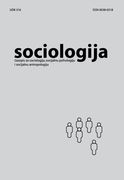(Dis)funkcionalni potencijal modela tradicionalnih crnogorskih rodnih odnosa u savremenim politikama identiteta
(Dis)functional Potential of the Traditional Montenegrin Gender Relations Model in Contemporary Identity Politics
Author(s): Branko BanovićSubject(s): Social Sciences
Published by: Sociološko naučno društvo Srbije
Keywords: multiculturalism; model of traditional Montenegrin gender relations; paradox of post-cultural anthropology; Miloš Milenković
Summary/Abstract: Multiculturalism demands essentialisation of “cultural differences”, thus “traditional” gender relations can be recognized as “differentia specifica” of a particular community. Special quality of traditional Montenegrin gender relations is that today we can only know characteristics of a traditional model of gender relations (not characteristics of real gender relations in the past). The practical implication in the contemporary politics of identity can be unrecognizing (or recognizing with silence) culturally generated disparities within gender relations recognized as the “specific” ones. The justification “it is their culture/tradition” will necessarily imply the justification for pleasant life of some people, agony of some other or even justification for the jeopardised physical integrity of some people. If anthropologists want to intervene in the social reality, they must manoeuvre within strictly determinated coordinates: about “traditional” Montenegrin gender relations we can only know based on “written” notions; in the politics of identity only those “written” notions can be recognized; traditional notions determine contemporary social relations; they perpetuate culturally generated disparities; in the multucultural politics of identity answer of society could be simple – “it is their culture/tradition”. For such a manoeuvring, within this kind of limited space of social reality, it is necessary in same way to harmonize post-cultural theoretical heritage of contemporary anthropology with essentialisation of cultural differences (contemporary anthropology have originated against this kind of essentialisation) - which is one of the most important challenges to contemporary anthropology.
Journal: Sociologija
- Issue Year: 54/2012
- Issue No: 3
- Page Range: 463-480
- Page Count: 18
- Language: Serbian

